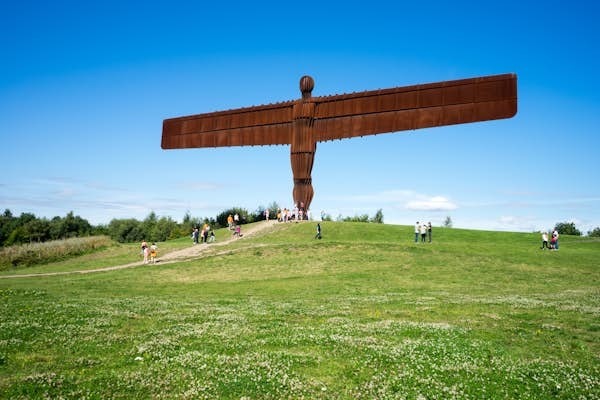Northeast England – with the dazzling Unesco-listed city of Durham, the lonesome hills of Northumberland National Park, Hadrian’s Wall, and Holy Island – is hardly an area lacking in world-class attractions. But the parts of the northeast in-between are much less well-known, and this is the rationale behind the creation of a new network of walking trails linking all the best bits. The routes entice today’s travelers by tracing the region’s exceptional history at the helm of the spread of Christianity across Europe.
Each of the walks overflows with historic sites and happenings. Delve into the Northeast’s heritage and it starts reading like a Who’s Who of the medieval world – small wonder Daniel Defoe once remarked that there was “abundant business for an antiquary” hereabouts.
Following the Northern Saints Trails
The compelling stories of St Cuthbert, the Christian world’s most revered saint for several centuries, imprint the sandy shores and inland moors that these routes traverse. But the tales and tribulations of St Oswald, the Northumbrian king under whom Christianity got reintroduced to Northumberland and consequently Britain, St Bede, author of some of the seminal works of the English language plus other holy figures and their histories are also etched upon the trail’s landscapes.

The hagiographical highlights give the six new interlinking routes their collective name – the Northern Saints Trails – but following them, what shines through is a history not solely of saints but of Roman Empirical grandeur, bloody battles of the Middle Ages, striking Victorian innovation and, last but not least, contemporary cultural clout.
Durham, fetchingly centered around one of Europe’s greatest cathedrals, and a major pilgrimage destination to this day due to the tombs of St Cuthbert and St Bede sequestered within, provides the theatrical finale to four of the trails.
The Way of Love
One, the Way of Love, leads here from the southeast at Hartlepool. This ship-building center might be best-known for its maritime heritage attractions – but you find yourself instead strolling Hartlepool Headland, contemplating the life of one of Britain’s most important female saints, St Hilda, or dallying in the forgotten denes – narrow, wooded valleys – that dot the countryside between here and Durham. Distance: 28 miles/45.5km

The Way of Life
A second trail, the Way of Life, arrives from the southwest at Gainford with its relatively unknown sights including the impressively rejuvenated historic attractions of Bishop Auckland and one of Britain’s most significant Roman forts. Distance: 29 miles/46.5km
The Way of Light
Another, the Way of Light, wends over the wild moors from the fabled Hadrian’s Wall to the northwest. And yet the little-lauded Devil’s Water, where a tributary of the Tyne babbles through forest beneath the broken fells of the North Pennines Area of Outstanding Natural Beauty (AONB), or the once-lauded former seminary of Ushaw with its spectacular series of churches and chapels, are just as special. Distance: 45 miles/72km

The Way of Learning
The Way of Learning, meanwhile, picks a more metropolitan but no less riveting route through to Durham from Jarrow and Sunderland, where walkers learn about Bede, the brilliantly accomplished monk and scholar known as the “Father of English History,” cutting-edge glassmaking techniques, the tranquil church which housed St Cuthbert’s remains long before the saint arrived at his permanent resting place in Durham… and how all are intrinsically linked. Distance: 38 miles/61km
The Angel’s Way
The Angel’s Way originates at Seaton Sluice near Newcastle-upon-Tyne and finishes up at Chester-le-Street, delving into Tyneside’s astounding legacy of art and architecture including Anthony Gormley’s 20-metre high steel Angel of the North that is this path’s prominent landmark. Distance: 30 miles/48km

The Way of the Sea
The Way of the Sea traces the seaboard from Amble down to North Shields. It takes in nationally important seabird colonies, breath-taking dunes, clifftop fortresses and the incomparable Spanish City, the Northeast’s recently revamped Art Deco take on Blackpool’s Pleasure Beach, immortalized in a song by rock band Dire Straits and with the said lyrics proudly emblazoned outside. Distance: 38 miles/61km.
A chance for escapism
It might make the Northern Saints Trails all the more poignant for traipsing the footsteps of such weighty historic figures, but they are not, the creators are keen to stress, only about pilgrimage – or a hands-on history lesson. They are themed around escapism generally – to the devastatingly beautiful terrain of a region blessed with cathedrals, castles, cracking country pubs, gentle sandy coastlines and giant craggy uplands.
To a world emerging from lockdown, the appeal of the places these paths join together should resonate just as much as in the Age of the Saints.
Due to the COVID-19 outbreak, a number of attractions, accommodation and food and drink businesses along the Northern Saints Trails may remain closed. We advise that you check directly with businesses prior to travel. A revised Countryside Code has been published to provide guidance for those visiting the countryside during the pandemic.
You might also like:
The world’s 7 best new long-distance hikes to do in 2020
Living by the tides on Northumberland’s Holy Island
England’s top eight Coast Path highlights
